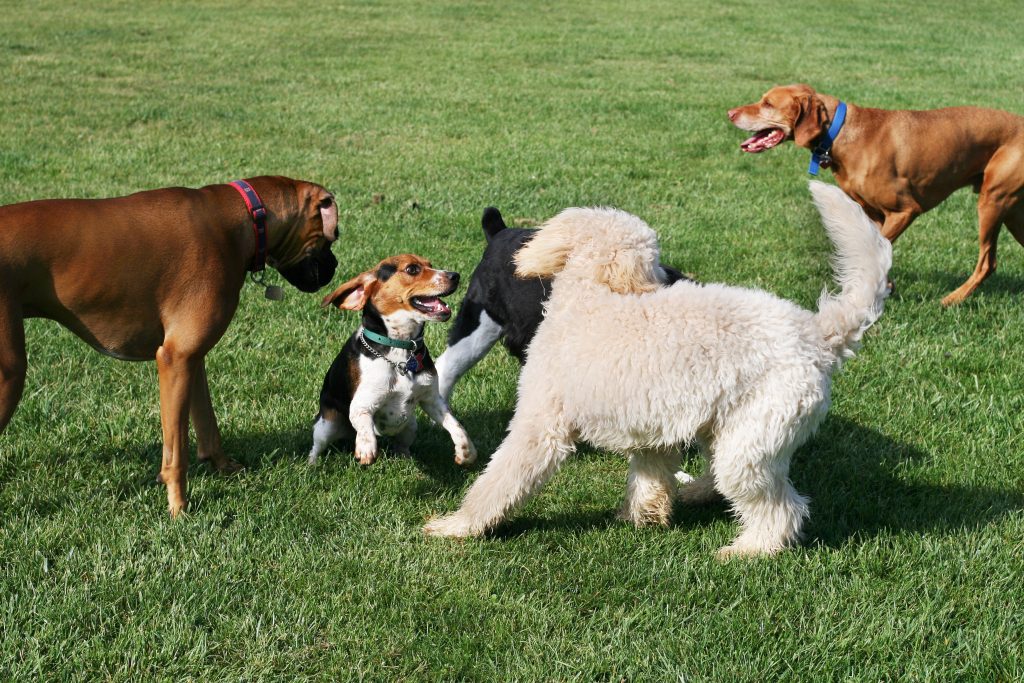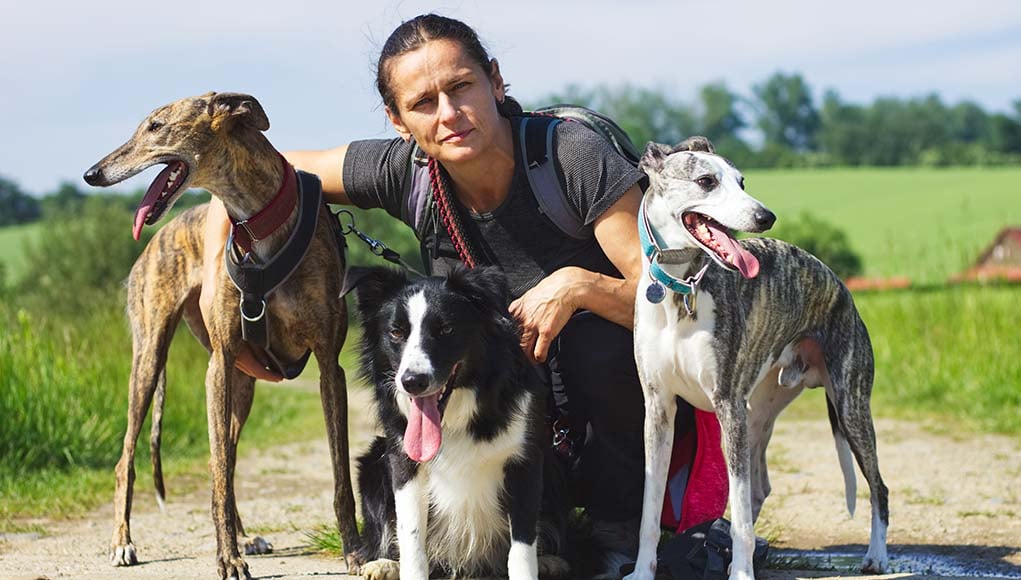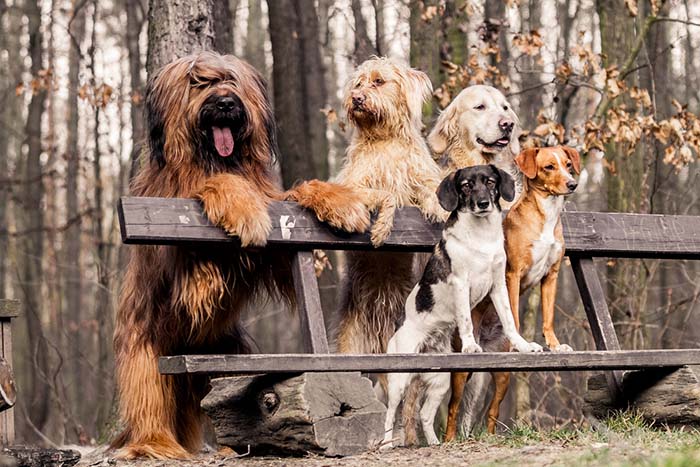
Table of Contents
We've all been there.
Pet owners of one dog think, “Maybe I should get one more.” Then, once you get the second dog, you'll think, “Oh, it'll be fun to get another one.” And then it goes on and on and on…
I get it. At one point, my family had seven dogs at home.
But how many dogs are too many?
Sure, there's no set number the state or federal government dictates us to have (except animal hoarders, which I hope you're not!)
But that doesn't mean we should adopt as many as possible just because we think it's fun.
As you may know, caring for pets requires a lot of time, money, energy, and love. You need to know that you have enough of these to equally give your multiple pets at home.
In this article, let's see what experts think about how many dogs are too many and what to consider when getting more than one pet.
How Many Dogs Are Too Many? What The Experts Say
Sorry to burst your bubble, but no, the answer is not “The more, the merrier.”
The answer, according to multiple sources, is “It depends on your lifestyle.”
In the United States, one or two dogs are the most acceptable number.
After all, according to the American Veterinary Medical Association, the average number of dogs owned in US households is about 1.46.
Perhaps the most common reason why some people would get a second dog is for the first dog to have company, especially when we leave for work.
I know because that's why I got my second dog.
However, that's not always a good idea. David Wright of iWorkdogs compared it to parenting. He said, “It's like if your parents were to pick your friends. There's no guarantee that the dogs will get along.”
As we know, each dog has their own temperament. While some are more tolerant, others might be better off living as a lone pet. Below, we have included a list of friendly breeds that do well in a multiple-pet household.
RELATED: 8 Tips on Adopting A Second Dog (Do It Right)
But a third dog might be on the horizon for those who really adore dogs and treat them as their own kid.
Multiple sources say getting a third dog is still fine. Some even say that the magic number is three.
Magical, if they're all well-trained, that is.
Also, pet grief coach Judy Helm Wright said it's all the better if the dogs are of various ages. “It has been my experience working with pets and pet owners that three dogs are the perfect tribe,” she added.
Three is perfect. Anything more can be… catastrophic.
Animal rescuer and Sniff Snout owner Karen Nash agrees. “I have had four dogs, and even being a professional, I found it to be a lot. With two or three, you still have enough time to devote to all and give individual attention.”
To conclude, one or two is great, three is acceptable, and four or more may be too many for most.
Except if you're a professional yourself, like an animal rescuer, and have the license, resources, and space to rescue, let's say, 8 to 10 or more dogs, then you can definitely go for it.
How Many Dogs Are Right for You?
Of course, based on your lifestyle, there's a way to determine how many dogs are right for you. Or at least if you should get another dog.
You can ask yourself these questions when you're tempted again to get that cute dog from the shelter.
Where Do You Live?
Where do you live, and how much space do you have?
If you live in a city with tighter spaces than suburban areas, maybe it's best to keep one to two small dogs.
As you know, dogs (especially when they're in Zoomies mode) need their own space to sleep, eat, and play around.
But if you live in a spacious house with a beautiful backyard, maybe getting a third dog (or whatever number you think you can manage) is all right, too.
The state where you live might also be a factor. Those living in northeastern states have fewer dogs than Midwesterners with sprawling outdoor spaces.
How Much Can You Afford?
Caring for one pet can still be expensive, especially if they have special or medical needs.
According to this Forbes article, the essentials alone can cost a pet owner an average of $1,533 annually.
But if you have to rely on doggy daycare, say twice a week, the average cost can be $2,980. And that's only for one dog.
Add pet insurance, unexpected vet bills, and fun plays and activities and you might be looking at $3,000+ a year.
How Much Time Do You Have?
Not because you have the space and the budget to get more dogs means you should get more. The next question to ask yourself is, do you have the time?
Each dog should get equal attention from you. One factor in responsible pet ownership is having the time to bond, play, and train them.
If you're single and working a full-time job, getting quality time with multiple dogs might be too much.
But if you're a family of four with two older kids, having more than one pet is okay since other family members can spend time with them.
What's Your Lifestyle?
If you're a jet-setter, you might also want to get a dog or dogs you can easily carry along with you. Otherwise, you'd need to spend serious dollars on dog boarding.
If you're an adventure seeker and love hiking, swimming, or any other outdoor activities, you should get dogs if you can bring them all along with you.
Of course, you should consider the gear and equipment you need here. More dogs means more carriers, harnesses, trackers, doggy backpacks, portable bowls… you get the idea.
What are the Needs of Your Current Dog?
I have mentioned above that some dogs are better left alone than being with another pet at home, but that's not all there is to it.
The current needs of your existing dog should also be considered.
If there are any behavioral issues, you should address them first. Otherwise, your existing dog might consider the new dog a trespasser and resort to aggression.
Older dogs are also more intolerant of strangers and unknown dogs. They can either get aggressive, anxious, or fearful of the new family fur member.
If this is the case, dog trainer Alice Fisher said it might be best to give your senior dog all your love exclusively and wait for them to pass before you get a new one. “When the first dog is moving towards the end of life, you owe them not to feel threatened in their home or overwhelmed,” Fisher said.
On the other hand, if you have one that's still a puppy, it's best to wait until they're at least a year old or just until you have properly trained them and bonded with them before getting a new one.
RELATED: Puppy Training 101: Basic Walkthrough
Sex should also be considered. And whether they're spayed or neutered, too. You might be asking for trouble if you forced two untrained alpha dogs to co-exist.
You can read more in AKC's guide here.
When Should You NOT Add a Second or More Dogs?
If your only reason for getting a new dog is to keep the first one company because you can't dedicate the time and effort, then you shouldn't get a new one.
In fact, I'm not sure if you should even have your first dog!
Also, assess your current dog's age, breed, health, and temperament. If they need your exclusive attention, better hold off on getting a new pet. If they're a senior dog, a puppy, or with sensitive conditions, focus on them first.
On top of that, you should also consider your family members, especially if you still have very young children or you live with people who have compromised mobility and immunity, like seniors or people with medical conditions.
At one point, having multiple dogs can be a stressor. We also know that dogs can be carriers of diseases.
And we don't want to aggravate any existing health issues in the family, do we?
Breeds that Do Well in a Multiple Pet Household
We have written a list of the Most Friendly Dog Breeds in the World. But for a quick preview, here are five of the best breeds you can get to ensure your dogs get along.
Labrador Retriever
There's a reason why Labradors are among the most popular breeds not only in the US but in the entire world.
They're quirky, they're lively, and most importantly, they're friendly!
You'll never make a mistake if you already have a Lab or wish to get a Lab as your second dog.
Golden Retriever
Another goofy breed that's sweet and quirky, Golden Retrievers are as friendly as they get.
Goldies are the quintessential family pets that can get along not just with new dogs or other animals in the house, but also with little ones.
In fact, if GRs can have pets of their own, I bet they would.
Beagle
Beagles also get along with everyone, even with new, strange dogs. They are curious, affectionate, and smart dogs.
And Beagles do best with companions. They have high separation anxiety, so leaving them alone for long hours will definitely affect their disposition.
Poodle
The thing about Poodles is that they are intelligent, so they are easier to train than most.
Poodles won't mind you bringing another dog into the house because they love to be people and other pets, too.
French Bulldog
Frenchies don't need much exercise, and they require little space, too.
So, if you want to balance them out with some dog who loves to run around, you can go ahead and do so.
Just make a proper introduction, and your dogs should get along well.
Breeds that are Best Left as Solo Pets
Most dogs are goofballs, but some might be better off living as solo pets.
These dogs can be quite temperamental and are too loyal, especially when they have formed a fierce bond with their owners.
This doesn't mean they're unfriendly; rather, they need more training and socialization skills to get along with other dogs:
The dog breeds best left as solo pets are:
Read PetPlace's list of Top Dog Breeds as Solo Pets.
How Many Dogs Are Too Many? Final Thoughts
When it comes to owning dogs, it seems that “good things come in threes.”
Anything more may already be too much, and if you try to bite more than you can chew, you, your family members, your home, and the dogs themselves may suffer.
But if you have all the resources necessary to raise happy and healthy dogs, then by all means!
Before getting three or more fur buddies for yourself, you have to be extra certain that you can give each one of them the best care possible.
It's not easy being a pet parent. It can be messy, it can get tiring, and it certainly can get expensive.
But being loved unconditionally, not only by one but multiple wagging tails and wet noses, is also one of the best feelings in the world.
How about you? How many dogs do you have as of now? Do you plan on getting more?
We'd love to read about your experiences in the comments section!
You can also read our recommended articles, which are linked below.















